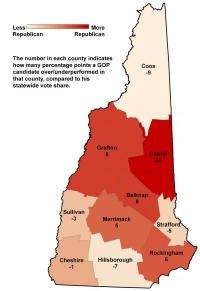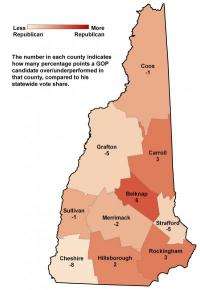N.H. voters have become less Republican since 1960s, new research shows

New Hampshire voters are about to observe their first-in-the-nation presidential primary. However, someone will be missing from this civic celebration: the Yankee Republican, that rural stalwart of New England conservative values, according to new research from the Carsey Institute at the University of New Hampshire.
"Once upon a time, the rural counties of New Hampshire were among the most Republican in the country. Nowadays, visiting out-of-state reporters are more likely to find Republican primary voters in the densely populated towns of the Granite State's southern tier. In the past, old-time New Hampshire Republicans frequently complained about the negative effects of Massachusetts voters moving north. Now, one might argue that Interstate 93 has only bolstered the state's Grand Old Party," says Dante Scala, associate professor of political science and a faculty fellow the Carsey Institute.
The key findings of the research show:
- Looking at presidential elections from 1960-2008, New Hampshire voters have become less Republican overall.
- Republican presidential candidates no longer have the advantage they once did in New Hampshire's "Yankee" rural counties.
- Historically Republican counties Grafton and Merrimack have both tilted Democratic consistently in recent decades.
- Hillsborough and Rockingham counties' percentage of Republican presidential primary voters across the state has grown from 44 percent in 1976 to 55 percent.

In 1976, voters in Hillsborough and Rockingham counties combined to cast 44 percent of all ballots in the Republican primary. By 2008, their portion of the primary vote had increased to 55 percent. Three of 10 votes were cast in Hillsborough alone, one of four in Rockingham.
Merrimack and Strafford counties have held steady in terms of voting power in the Republican primary, casting roughly one of five votes.
Thirty years ago, a Republican running for president could find a fair number of votes in the rural counties of the Granite State. One third of all GOP ballots cast in the 1976 primary came from places such as Belknap (6 percent of all ballots) and Carroll (5 percent), as well as counties bordering Vermont such as Grafton (8 percent) and Cheshire (7 percent). Even Coös County accounted for 4 percent of all GOP primary votes.
By 2008, Coös County's "voting power" in the primary had shrunk by half, from 4 percent of ballots cast to just 2 percent. And the influence of the rural periphery as a whole has waned significantly. These six counties now account for just one of every four votes cast in the presidential primary.
"On the one hand, national political reporters will have an increasingly difficult time landing an interview with the laconic old-timer sporting the red plaid jacket. On the other, a chief complaint about the New Hampshire primary—that its voters are too rural, hence too unrepresentative of the general electorate—is dissipating," Scala says.
"The fate of Mitt Romney, Newt Gingrich, and the other competitors will largely be decided by voters who live within the environs of the Greater Boston metropolitan area. As such, they might be a harbinger of how Republicans in other suburbs around the country may choose when it is their turn to cast votes," he said.
More information: The complete report about this research, "Changes in New Hampshire's Republican Party: Evolving Footprint in Presidential Politics, 1960-2008," is available at carseyinstitute.unh.edu/Carsey … ch/search.php?id=182
Provided by University of New Hampshire















